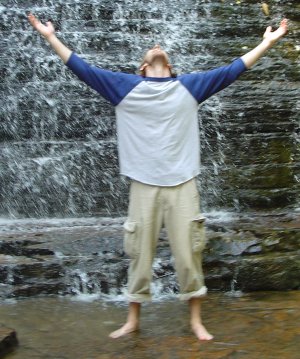I read an interesting short story by Robert Heinlein the other night entitled "Life Line". The basic premise is a scientist develops a machine and method of finding exactly when one's life ends (he can also tell when you were born, but, as he notes, you already know that and it is not quite as exciting!). I don't really want to give away the twists of the story, but it is quite interesting to see where he goes with it. One of my favorite little sub-themes he touches on is a conception that time is as time is, and we can do little to change it. For the main character, in the end, tries to prevent a certain death he percieves - which, in the end, seems to almost come about because of his efforts.
In another book I have, Byzantium, by Stephen R. Lawhead, the main character gets what he thinks is a vision of when he will die. Throughout the book he is haunted by this knowledge. In a conversation with a fellow character, though, a different perspective is presented to the main character. He asks a friend how knowing when he would die would change how he lived, the character responds that that he could live without fear, basically invicible, until that time. Why? Because he would know that nothing could kill him until that time. An agressive, but interesting thought.
Why is death so interesting? Why would everyone want to know their time? I think it is one of life's great "eveners" - it is in death that there is no social or material stratification, no racial or sexual prejudice. You can be the CEO of a multi-billion dollar company or a homeless joe-schmo on the streets, but when death comes you're both dead.
Outside of religion there is no hope after death, it spells an end, and that is all. Which seems to put everything else in a rather hopeless light, in my mind. Whatever legacy, or lack thereof, that you leave behind does not grant you any special place in the land of the dead - for if the atheists are right, and there truly is nothing after death, when you are dead, that is all. A legacy gives you no more life and benefits you not a mite. But, if you are of the religious persuasion, then death proves a gateway to something more.
In my mind, death provides a gateway to an upclose and personal encounter with a perfectly just and righteous God. If this encounter goes unmediated, then you are toast - spiritually and literally, for every man has lived and practiced injustice, selfishness, etc. at some point in his or her life. But, if you can find a mediator, one to help you come before God, one who can be your righteousness, then death can become a gateway to a reality undreamt of in this realm.
So it remains, what is death to you? Is it the end, or is it a gateway to something more? I think how one perceives death impacts how he or she lives life, for it is an end we all must encounter.
Friday, June 01, 2007
Subscribe to:
Comments (Atom)
